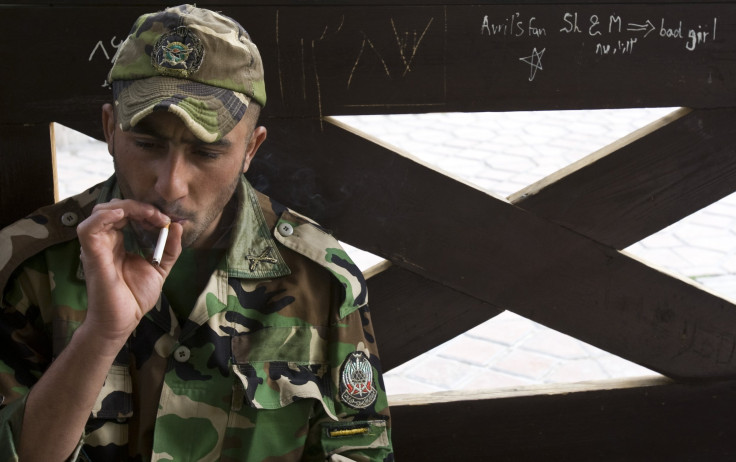Iran Nuclear Deal: Big Tobacco Sees Opportunity For Cigarette Market Amid Lagging Revenues Elsewhere

It’s not just Big Macs, Frappucinos, iPads and other stereotypical Western commercial products that could soon trickle legally into Iran. If sanctions are lifted, Tehranis might eventually have access to legal Marlboros and other Western cigarette brands that are otherwise smuggled into the country.
After the signing of a nuclear accord in July, international sanctions on Iran could be repealed as early as next year, and tobacco companies are jostling for their share in a major untapped market in the Middle East. For the past several years, cigarette sales in developed countries have lagged, spurring tobacco companies to pivot toward emerging markets. The addition of Iran could be a significant boon for these companies – depending on which ones secure a stronger foothold first.
"What it really comes down to is a battle over market share," Esfandyar Batmanghelidj, who founded the Virginia-based Iran Tobacco Research Group and has published extensively on the political economy of smoking and the cigarette trade in Iran, said. "There’s definitely interest on the part of the traditional major global players in tobacco...in getting back into Iran in a serious way."
The World Bank classifies Iran as an “upper middle-income” country, and its 80 million people make it the second-largest country in the Middle East by population, after Egypt. By some estimates, Iranians spend $3.3 billion on and smoke about 52.6 billion cigarettes every year. The number of smokers is rising, too, from 7.65 percent of the population in 2010 to 8.55 percent in 2014, according to a report published in August by Euromonitor International, a business intelligence research group based in London. Others have suggested that smoking rates are substantially higher. According to Kenneth Shea, a senior analyst at Bloomberg Intelligence, about 15 percent of Iranians smoke, and "that number has generally edged higher over the years," he said. Batmanghelidj, meanwhile, estimated that smoking rates in Iran could exceed 20 percent.
The past decade of sanctions has largely closed Iran off from the West and the global economy, a scenario tobacco companies have been waiting to change. “The international cigarette industry has long viewed Iran as a ripe fruit waiting to be plucked,” said Euromonitor's report. In addition to having rising smoking rates, “Iran is conveniently located, wedged between the tobacco industry’s established smuggling centers in the Middle East and the burgeoning tobacco markets in the Indian subcontinent and Russia,” the report said.
In Iran, a pack of cigarettes costs roughly U.S. $0.50 for a local brand and $1 for an international brand, offering little in the way as a financial deterrent to smoking. Meanwhile, the perception is growing among young women there that smoking cigarettes is a “fashionable way of relaxing,” according to the Euromonitor report. A government ban on public smoking has also hardly been a damper on the habit.
In Iran, the state-owned Iranian Tobacco Company controls 38 percent of the market, according to Encyclopedia Iranica, an academic reference project run by the Center for Iranian Studies at Columbia University in New York. British American Tobacco and Japan Tobacco International control the majority of the remaining 62 percent.
Sanctions in the past decade have prevented foreign tobacco companies from legally importing their cigarettes in a way that was not extremely expensive or strapped with red tape. During the 1970s and 1980s, Western brands, like Winstons, Gauloises or Marlboros, were the most popular among Iranians, according to Batmanghelidj. But with restrictions slated to be scaled back, companies "can cost effectively import a much higher volume of cigarettes into the country and take back their market share," Batmanghelidj said.
In developed countries, cigarette sales are declining as more people become aware of the health effects of smoking cigarettes. Government regulations have also helped drive down sales and consumption by banning smoking in many places and by imposing hefty taxes on packs of cigarettes. Overall, global cigarette sales declined 0.4 percent from 2013 to 2014. Shea, the Bloomberg analyst, said that the average global smoking rate had decreased slightly in recent years and that cigarette sales by volume had also diminished.
The industry itself has openly acknowledged this decline and its causes. “We think that individual smokers will consume fewer cigarettes each and smaller percentages of populations will smoke,” reads the section titled “The global market” on British American Tobacco’s website. “Regulation of the industry also continues to increase,” it added.
Kafka and Cigarettes in #Tehran- More great pics from @heartmybackpack http://t.co/OapnT21JFV #Iran pic.twitter.com/KicijyeFIQ
— Reza Shaeri (@RezaShaer) March 30, 2014Sanctions on Iran cannot be lifted until the International Atomic Energy Agency, the global nuclear watchdog, finishes a report slated for completion Dec. 15 confirming that the country has fulfilled its obligations under the terms of the international accord, which bars it from developing a nuclear weapons program. But that hasn't stopped some tobacco companies from making moves, albeit guarded ones.
Japan Tobacco International (JTI) , which along with British American Tobacco is one of two foreign tobacco companies to operate legally in Iran, recently bought Iranian cigarette manufacturer Arian Tobacco Industry for an undisclosed amount, the Financial Times reported in October.
The Financial Times reported that JTI made the move in an apparent effort to gain a foothold in the Iranian market ahead of the rumored entry of industry behemoth Philip Morris International, which according to its website controlled 15.5 percent of the tobacco market outside the U.S. in 2014. But a spokesperson for JTI said otherwise in an email to International Business Times. “We do not speculate on competitors’ commercial moves,” the spokesperson said, adding, “The acquisition was mainly aimed at consolidating our presence [in Iran].”
JTI has operated in Iran since 2002. “We have always believed in the economic potential of this country,” the spokesperson said. “Iran is a significant country with important natural resources and a large population. We have always believed that Iran meets many conditions to grow economically.”

Some tobacco companies have been silent about their post-sanctions ambitions in the Iranian market. Philip Morris International, maker of Marlboros, does not appear to have revealed plans -- at least, not publicly -- to jump into the Iranian market.
“We are following the developments on sanctions and will consider our business opportunities if and when warranted,” Philip Morris International said in response to emailed questions regarding its prospects in Iran.
But not everyone is looking forward to the possibility of having more tobacco companies in Iran. As of 2009, lung cancer was the fifth most common cancer in Iran, and its rates were increasing, Iranian researchers found in a study published that year. They attributed the increase in part to cigarette smoking. Health advocates fear that the advent of more companies will exacerbate the situation further.
Dr. Gholamreza Heydari, director of the tobacco prevention and control research center at Shahid Behesthi University of Medical Sciences in Tehran, said in an email that even though Philip Morris’ products were already available, albeit illegally, in the country, an increase in tobacco companies that are legally doing business there could lower cigarette prices and therefore increase smoking. He said it would undercut health advocates’ already struggling efforts to raise the price of cigarettes through taxes, setting up a fresh battle in the fight against Big Tobacco.
© Copyright IBTimes 2024. All rights reserved.






















